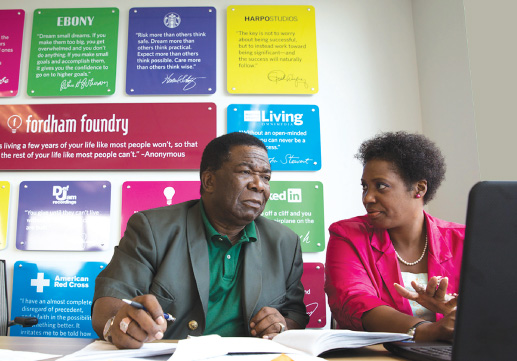
and financial planning practice, L. Wright Co. LLC.
Photo by Bud Glick
When the Fordham Foundry opened its doors to the community in March, its objective as a business incubator was to help build the economy in the neighboring Bronx.
To help reach its goal, the Foundry, a collaborative program between New York City’s Department of Small Business Services (SBS) and Fordham’s Center for Entrepreneurship, has chosen four businesses run by current and former Fordham students as its first partners.
They are:
• Concourse Fund, a nonprofit that plans to establish a microloan program for small businesses, develop a network of Fordham students to assist the Bronx’s struggling credit unions, and help people establish savings accounts and get loans. The fund was founded by Andrew Kingsley, GSB ’13, and Ryan Conroy, a junior in the Gabelli School of Business.
• Martin Experiments LLC, a Web development firm that aims to help companies build websites that play equally well on mobile devices and desktops. It was founded by Alexander Martin, FCRH ’13, and Seve de Respino, a Gabelli School of Business sophomore.
• L. Wright Co. LLC, an accounting and financial planning practice founded by Lavera Wright, a senior in the School of Professional and Continuing Studies.
• Smart Girls Group, an online community and magazine that aims to connect, inspire, and empower girls worldwide, from middle school to college. It was founded by Gabelli School of Business sophomore Emily Raleigh.
The four were chosen from an initial pool of 26 applicants, and represent the first wave of what Foundry co-directors Christine Janssen-Selvadurai, Ph.D., and Mitchell Fillet hope will be long partnerships. Two more partnerships are to be announced in the coming months.
“As a Jesuit university, it’s baked into the mission to serve others and give back,” said Janssen-Selvadurai, director of the entrepreneurship program at the Gabelli School of Business. “So the Fordham Foundry mission has always been, ‘Yes, we want to serve the Fordham community, but we want to do more for the Bronx as well.’”
Concourse Fund founder Kingsley had already had a hand in serving the community; before starting the fund, he volunteered at the Bethex Federal Credit Union, a Community Development Financial Institution offering services to eligible low- to moderate-income members throughout the city.
“I didn’t know what a credit union was,” said Kingsley. “But [Joy Cousiminer], who established Bethex in 1970, works seven days a week, 14 hours a day to help bring banking to a part of the city where many people have little access to financial services,” he said.
Kingsley said he wanted the opportunity to learn from her. “There’s 56 percent of the population here that doesn’t have access to a bank account. If you want to save for college or buy a car or start a business, you can’t do it.”
As Foundry partners, Kingsley and the other entrepreneurs have access to low-cost workspace at the Foundry’s new offices on Webster Avenue. They will be followed closely by Foundry staff, with quarterly meetings to help keep them on target.
Janssen-Selvadurai is also on the prowl for Fordham alumni and faculty who would be willing to serve as mentors to the budding entrepreneurs.
“Research clearly that shows if you do business in an incubator, you have a much greater chance of success,” she said. “Entrepreneurs who have mentors also tend to be much more successful.”
The Foundry is still accepting applications from members of the Fordham community—students, faculty, staff, alumni, and parents—and there are no restrictions on the types of businesses that can apply.
For more information on how to apply, visit www.fordhamfoundry.org
